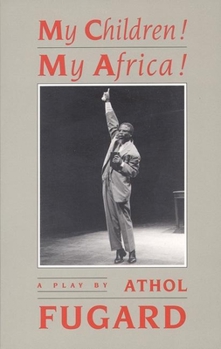My Children! My Africa! (Tcg Edition)
Select Format
Select Condition 
Book Overview
The search for a means to an end to apartheid erupts into conflict between a black township youth and his "old-fashioned" black teacher.
Format:Paperback
Language:English
ISBN:1559360143
ISBN13:9781559360142
Release Date:January 1989
Publisher:Theatre Communications Group
Length:96 Pages
Weight:0.34 lbs.
Dimensions:0.3" x 5.4" x 8.4"
Related Subjects
African British & Irish Discrimination & Racism Drama History Literature & Fiction Race RelationsCustomer Reviews
4 ratings
Powerful, but flawed, play
Published by Thriftbooks.com User , 16 years ago
"My Children! My Africa!" is a flawed, yet powerful play first performed in 1989 in South Africa. Fugard is a talented playwright, but his assumptions are somewhat off. The text centers around three characters set in "State of Emergency" 1984 South Africa. Isabel, a white, precocious Afrikaner; Thami, a black, independent African; and Mr. M, the teacher, caught in the middle of events not so out of their control. The story is somewhat about reconciliation and the power of education and discipline. Yet, things fall apart as Thami rebels in his mind against the Bantu education and the Western teachings (taught to him by his teacher Mr. M). In the end, all three pay the price for their friendship, but that is not the most of it. In all honesty, the play taken with a grain of salt is moving and I felt my chest tighten and my heart race as Fugard effortlessly moves the reader through this trying time. But upon reflection, problems begin to emerge. One is the assumptions are raised. Fugard is obviously anti-apartheid, but does the future of South Africa, as he was predicting in 1989, lay with those like Thami or those like Isabel. Thami, who begins to be swept away by the movements in Southern Africa (notably Angola, Zimbabwe and Mozambique) is given a negative aura by Fugard, as if he lets his emotions rule his better reasoning, exemplified by Mr. M. As one critic points out, Fugard, in the end, voices the beliefs of the white, middle class South Africa through characters like Isabel and Mr. M. The violence, which is "inevitably" what Thami will adopt, will only hurt South Africa's future after apartheid even more. The other is the historical inaccuracies. The book was written in 1989, but set in 1984. Fugard uses the play as a weather-vane and a crystal ball in which he attempts to predict the future by rewriting the past. He misrepresents 1980s South Africa and movements like the UDF, essential to the ending of racial hierarchy in 1994, by having Thami break off Isabel and his friendship because blacks and whites were not allowed to mix and be friends. Fugard also uses history, on which Thami builds his new found historical consciousness, to downplay the positive roles of social movements in South Africa. Then there is the story of Mr. M, which Fugard rips right from the newspapers (he even keeps his same name) yet is not given proper justice. The reason the play got 4 stars instead of 3 resides in Fugard's character, Thami. In my opinion, Thami transcends the near stranglehold that Fugard attempts to impose upon him. The events Fugard banked on us forgetting: Klipstown in 1955, Sharpsville in 1960, or Soweto in 1976. Don't follow Mr. M's bogus mantra of "correctly" reading or voting or seeing things - because more often than not, you're being misled in ways that cannot be seen. Instead, read with an open mind and let history guide you the rest of the way.
Apartheid's Lethal Breath Exposed
Published by Thriftbooks.com User , 20 years ago
Here is a painful play about the hope of a country and it's people falling by the wayside under the mad rush of anger and rage and frustration. There are only three characters here: Mr. M, a black teacher in Brakwater, called "the location," the black town outside the white town of Camdeboo. Thami, also black, is a leading young student, and protege of Mr. M. And Isabel, a white girl Thami's age, who befriends both of them after an interschool debate. Together the three of them agree to prepare for a competition which may represent the best and brightest of a new generation of South Africans. One that is marked by a union between blacks and whites, in the spirit of education, knowledge and words. Such is the hope. But the hope ultimately gives way to the heart wrenching evil of apartheid as it cuts the three apart. Mr. M and Thami diverge about how to fight apartheid and Isabel struggles as her new friendships crack, and spirits wane. Painful. Spiritually uplifting, then crushing. Eye opening.
It made me cry!
Published by Thriftbooks.com User , 24 years ago
My Children! My Africa! was the first book I've read ever to make me cry--so much towards the end that I had to put it down. It is the touching tale of a white South African girl who befriends a black South African boy and his teacher, amidst a time of strong racial tension. Their teacher helps them to learn that even though others may be at war, they still have the chance to pave the road to a new, better Africa. Fugard's best play ever!
A very powerful play addressing the South African situation.
Published by Thriftbooks.com User , 25 years ago
In My Chindren! My Africa!, Fugard tells the story of a white South African girl who becomes involved in debates with a black South African boy and his teacher, but as the racial tension increases, tragedy becomes inevetable. Fugard tells a powerful story which not only addresses the racially charged South Africa he is from, but race relations and the need to realize the differences between people of race are only skin deep.






